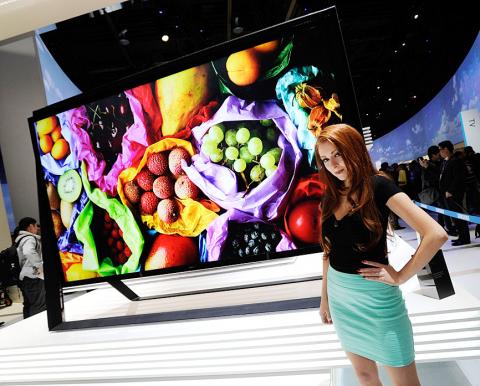The world’s biggest gadget show ended in Las Vegas on Friday and, like a prophet in the desert, revealed the future: bigger televisions, smarter watches, thinner humans and bendy phones.
That, at least, was the vision peddled by technology companies that unveiled 20,000 products over five frenzied days of networking and promotion at the Consumer Electronics Show (CES). About 150,000 industry professionals sifted through gadgets sublime and ridiculous, pointless and ingenious, seeking the next big innovation that will change the way we work, live and play.
Some ideas that provoked guffaws and headlines — the vibrating fork which chastises you to eat slower, the i-potty training system to keep your toddler on the bowl — may not endure, but others seemed certain to have a future.

Photo: AFP
Samsung, Sony, Toshiba and other television manufactures unveiled bigger screens — ranging from 50 to 110 inches — with “ultra-high-definition” four times sharper than traditional HD. Prices range from US$20,000 upwards.
2D prototypes marked the quiet death of 3D television, a much-hyped innovation at last year’s CES that flopped in stores. The technology may resurrect if the likes of StreamTV Networks convince consumers to buy 3D TVs, due out later this year, which do not require glasses.
Pebble, a kickstarter darling, won instant acclaim by unveiling a much-ballyhooed smart watch with e-paper display that connects to a smartphone and can receive e-mails, control music and track your movement. Priced US$150, there are 85,000 pre-orders.
“We had to get it right, it’s on your wrist,” Pebble founder Eric Migicovsky said. “People won’t tolerate something bad being attached to their body.”
The show signaled an accelerating drive by tech firms to sell the idea that technology is key to mental and physical well-being, with a quarter of displays devoted to gadgets for losing weight, getting fitter and improving health.
They harnessed smartphones and tablets to “wearable” fitness devices that monitor your exertions and store them in the cloud. Diabetics were offered apps to monitor their condition.
“It’s an inherently data-driven activity,” Joseph Martorano of iHealth said.
Samsung unveiled a prototype phone — super-thin plastic replaces traditional glass — which lets you fold it almost like paper. The technology, called Youm, will spread to other devices.
However, all the gadgetry did not dispel doubts that the expo is losing relevance. The event focused on hardware in a software-obsessed world and contained no major surprises. Some tech gurus declared CES a dying giant. True or not, the hordes leaving Las Vegas with their bags of freebie “swag” were happy.

Meta Platforms Inc offered US$100 million bonuses to OpenAI employees in an unsuccessful bid to poach the ChatGPT maker’s talent and strengthen its own generative artificial intelligence (AI) teams, OpenAI CEO Sam Altman has said. Facebook’s parent company — a competitor of OpenAI — also offered “giant” annual salaries exceeding US$100 million to OpenAI staffers, Altman said in an interview on the Uncapped with Jack Altman podcast released on Tuesday. “It is crazy,” Sam Altman told his brother Jack in the interview. “I’m really happy that at least so far none of our best people have decided to take them

BYPASSING CHINA TARIFFS: In the first five months of this year, Foxconn sent US$4.4bn of iPhones to the US from India, compared with US$3.7bn in the whole of last year Nearly all the iPhones exported by Foxconn Technology Group (富士康科技集團) from India went to the US between March and last month, customs data showed, far above last year’s average of 50 percent and a clear sign of Apple Inc’s efforts to bypass high US tariffs imposed on China. The numbers, being reported by Reuters for the first time, show that Apple has realigned its India exports to almost exclusively serve the US market, when previously the devices were more widely distributed to nations including the Netherlands and the Czech Republic. During March to last month, Foxconn, known as Hon Hai Precision Industry

PLANS: MSI is also planning to upgrade its service center in the Netherlands Micro-Star International Co (MSI, 微星) yesterday said it plans to set up a server assembly line at its Poland service center this year at the earliest. The computer and peripherals manufacturer expects that the new server assembly line would shorten transportation times in shipments to European countries, a company spokesperson told the Taipei Times by telephone. MSI manufactures motherboards, graphics cards, notebook computers, servers, optical storage devices and communication devices. The company operates plants in Taiwan and China, and runs a global network of service centers. The company is also considering upgrading its service center in the Netherlands into a

Taiwan’s property market is entering a freeze, with mortgage activity across the nation’s six largest cities plummeting in the first quarter, H&B Realty Co (住商不動產) said yesterday, citing mounting pressure on housing demand amid tighter lending rules and regulatory curbs. Mortgage applications in Taipei, New Taipei City, Taoyuan, Taichung, Tainan and Kaohsiung totaled 28,078 from January to March, a sharp 36.3 percent decline from 44,082 in the same period last year, the nation’s largest real-estate brokerage by franchise said, citing data from the Joint Credit Information Center (JCIC, 聯徵中心). “The simultaneous decline across all six cities reflects just how drastically the market